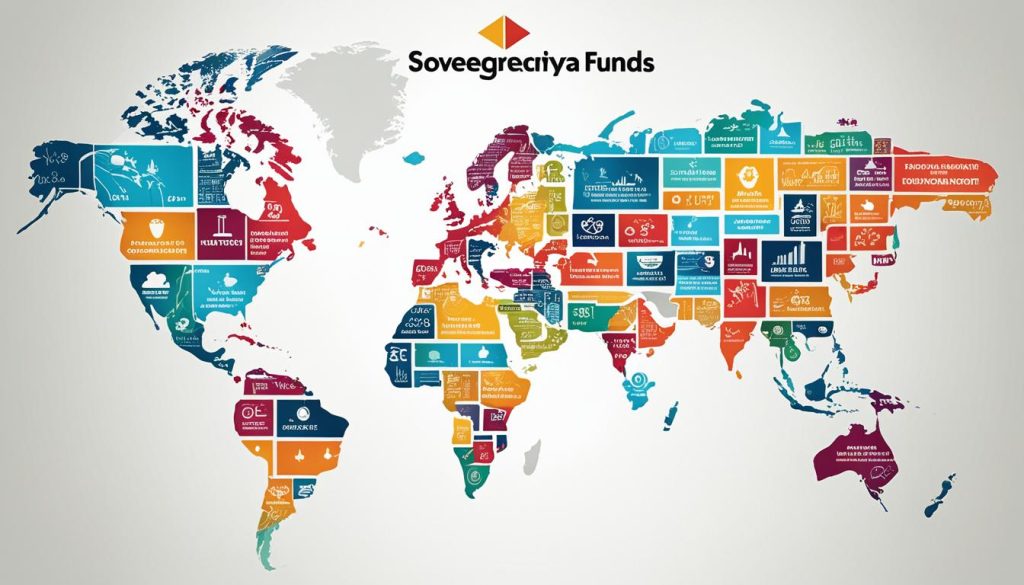Who really owns the big companies that operate worldwide? It’s key to understand this to get how global business works. The people or groups who own these companies can greatly influence their decisions and overall running. This piece explores the different types of ownership, who has big shares, and the power of institutional investors in big companies. We use insights from top sources like Forbes, Financial Times, and Harvard Business Review. Our goal is to clearly explain the ownership patterns and how they affect the way these big companies are managed.
Key Takeaways
- Multinational corporations have diverse ownership structures affecting their governance.
- Institutional investors play a significant role in global business stakeholders.
- Private and public ownership models offer distinct advantages and challenges.
- Family ownership and state-owned enterprises present unique corporate governance dynamics.
- Shareholding patterns are influenced by cross-border mergers, acquisitions, and private equity firms.
Introduction to Multinational Corporations
Multinational corporations (MNCs) are a major part of the global economy. They affect international business and add to globalisation. Over time, their role has changed. They now shape how businesses work around the world and help economies grow.
Defining Multinational Corporations
An MNC is a company that operates in different countries, not just where it was started. It uses subsidiaries, affiliates, or branches to reach new markets. The Encyclopedia of Global Studies says MNCs are good at using resources from across the world. This lets them be more competitive globally.
Historical Context and Evolution
The idea of MNCs goes back to when countries wanted to trade overseas. Companies like the British East India Company were important. The Journal of International Business Studies tells us they started global trade routes. This helped shape today’s MNCs.
By the 20th century, companies like General Electric and Toyota showed how fast MNCs could grow. According to the Business History Review, they changed many industries. They also affected economies worldwide. Now, MNCs keep bringing new ideas, setting trends, and moving money and resources globally.
Ownership Structures in Global Corporations
It’s vital to understand the ownership setups in big companies across the world. These setups show how owning shares affects the way companies are run and their strategies. You’ll see different models of ownership in both private and public companies, each bringing its own set of pros and cons.
Types of Ownership Models
Different ownership models exist in large corporations, reflecting varied ways in which equity is held.
- Sole Proprietorship: This is where a single person owns and runs a business. It’s more common in small ventures than in big international firms.
- Partnership: This model has two or more people owning, sharing resources, and responsibilities. It’s found in both small and larger businesses.
- Corporation: Corporations are notable for being able to issue shares. This separates the owners from the managers and opens up broader equity ownership. Corporations can be either privately owned or public.
- Cooperative: Here, everyone involved owns the business. This includes workers and customers, aiming for a fair share of profits for all.
Private vs Public Ownership
Private companies keep their ownership within a small group, often the founders or a few investors. They don’t have to share much about their finances, giving them more privacy. On the other hand, publicly traded corporations sell their shares to anyone through the stock market. This needs them to be very open with financial information, affecting how they are structured a lot.
| Aspects | Private Companies | Public Corporations |
|---|---|---|
| Equity Ownership | Chosen by a few | Widely available through public shares |
| Regulatory Oversight | Lesser rules to follow | More rules, requiring regular updates to the public |
| Corporate Structure | Flexible, easily changed | More layers and fixed in structure |
Choosing between private and public ownership shapes a company in big ways. It decides how the company operates and its strategy on the global stage. Both options offer different advantages and challenges.
Who Owns Multinational Corporations?

Finding out who owns multinational corporations is not straightforward. It covers various shareholders and investors. We will look at the main groups influencing these global giants.
Major Shareholders and Investors
Key shareholders play a major role in setting the direction of multinational corporations. They include big corporate investors with large shares. Bloomberg states these main shareholders have a lot of voting power. This allows them to influence big decisions in the corporation.
Institutional Investors’ Role
A big chunk of ownership in multinational companies is held by institutional investors. According to The Economist, these investors include pension funds and mutual funds. They push for good corporate governance and fight for shareholders’ rights. Their influence is large.
Family Ownership in Multinational Corporations
Family-owned businesses are significant in multinational corporations too. Family Business Review shows family ownership shapes company culture and future plans. Family shareholders want steady growth and stability, unlike other investors who may seek quick profits.
Here’s a simple recap of the main shareholder types in multinational corporations:
| Category | Influence | Example |
|---|---|---|
| Principal Shareholders | High voting power, strategy shaping | Corporate investors holding major stakes |
| Institutional Investors | Governance reform, shareholder advocacy | Pension funds, mutual funds |
| Family Shareholders | Long-term vision, stability focus | Founding family members |
Government Ownership and Influence
Governments play a big part in the business world. They control many firms and shape economics. It’s key to understand the role of government-run companies and how much the state owns businesses.
State-Owned Enterprises
State-owned enterprises (SOEs) are vital in many countries. They offer essential services and support key industries. The World Bank notes that SOEs help drive development, especially where industrial growth is ongoing.
In China, SOEs show how government can influence industries. Companies like PetroChina lead in their fields, thanks to public sector power. Similarly, France has a strong SOE presence in utilities and transport.
Government Stake in Private Corporations
Governments don’t just run businesses; they often own parts of private ones too. This creates mixed companies that aim for efficiency and public goals. The International Journal of Public Sector Management says these shares are strategic. They ensure control over important areas or rescue key industries.
Having a stake in companies allows governments to get dividends and oversee regulations. It helps in applying public policies. For example, France and Germany own shares in Renault and Deutsche Telekom. This shows how they influence the business world, balancing markets and national interests.
Impact of Institutional Investors
Institutional investors, like pension and mutual funds, greatly impact corporate worlds. Institutional investment’s impact is vast, affecting financial and governance structures.
A piece in Institutional Investor Magazine explores their effects. On one side, they boost governance through professional scrutiny. Yet, they might cause conflicts, especially in aligning shareholder goals.
Pension funds in corporate ownership play a big role. They focus on long-term growth and sustainable actions. As major shareholders, they guide company decisions and push for shareholder focus.
An article in Academy of Management Journal notes a shift in shareholder activism. Institutional investments have made investors more engaged. They are key in pushing companies towards practices that match shareholder values, aiming for better profits and sustainability.
The key impacts of institutional investors include:
- Improved governance and scrutiny
- Potential conflicts of interest from their position
- Support for sustainable, responsible practices
- More shareholder activism and involvement
| Aspect | Positive Impact | Negative Impact |
|---|---|---|
| Corporate Governance | Heightened scrutiny and improved practices | Possible conflicts of interest |
| Investment Strategies | Focus on long-term stability | Misalignment of short-term goals |
| Shareholder Activism | Encourages responsible practices | Excessive interference in management |
The Role of Sovereign Wealth Funds

Sovereign investment plays a crucial part in the world’s economy. Sovereign wealth funds, as state financial tools, shape global markets by investing widely. They have grown over years thanks to smart managing and planning by governments.
A detailed view from The Journal of Economic Perspectives highlights how these funds work and their impact globally. They stabilize national economies by spreading out investments. This helps protect against turns in the economy.
The Sovereign Wealth Fund Institute shows how big these funds are. Countries like Norway and China set great examples with their own funds. They aim for high profits and make moves that could also bring geopolitical benefits.
Globally, wealth funds seek to ensure financial safety for the future and influence world markets. Their investments include infrastructure and tech companies. This leads to big economic and developmental changes around the world.
The table below gives an overview of key sovereign wealth funds and their assets.
| Fund | Country | AUM (USD Billion) |
|---|---|---|
| Government Pension Fund Global | Norway | 1,300 |
| China Investment Corporation | China | 1,000 |
| Abu Dhabi Investment Authority | UAE | 829 |
| Kuwait Investment Authority | Kuwait | 700 |
These sovereign funds have big influence on the world. They set new trends and strategies in investing, affecting economies in big ways.
Cross-Border Mergers and Acquisitions
Global business dynamics shift greatly with cross-border mergers and acquisitions. They need careful planning, strategy, and understanding of laws.
Merger Examples
Incredible mergers like Glaxo Wellcome and SmithKline Beecham joining to become GlaxoSmithKline show cross-border benefits. Likewise, the fusion of Sanofi and Aventis into Sanofi-Aventis boosted their competitive edge.
Acquisition Success Stories
Stories like Kraft Heinz buying Unilever, and Mondelez acquiring Cadbury, show the power of strategic planning. These deals not only grew their markets but also relied on thorough preparations for smooth integration.
Regulatory Considerations
Knowing the rules is key for cross-border deal success. Agencies like the European Commission and the Federal Trade Commission watch over fair play and prevent monopolies. Sticking to these rules ensures smooth deals.
| Company | Merger/Acquisition Partner | Year | Outcome |
|---|---|---|---|
| GlaxoSmithKline | SmithKline Beecham | 2000 | Enhanced Pharma Capabilities |
| Sanofi-Aventis | Aventis | 2004 | Expanded Global Reach |
| Kraft Heinz | Unilever | 2017 | Strategic Market Expansion |
| Mondelez International | Cadbury | 2010 | Increased Market Share |
Influence of Private Equity Firms
Private equity firms greatly influence multinational companies with their unique investment tactics. They use private money in the global market to increase value and growth.
Investment Strategies
These firms have various ways to boost returns. Leveraged buyouts (LBOs) are one approach. In an LBO, firms borrow a lot of money to buy companies. This lets them take over companies that are not doing well or are undervalued. They then improve these companies to reach their true worth. Another method is growth capital investments. This involves giving private funds to already established companies. This money helps these firms grow bigger worldwide.
Case Studies of Private Equity in Multinationals
Many success stories show how private equity has transformed big corporations. For example, Blackstone Group’s purchase of Hilton Worldwide is significant. Blackstone restructured Hilton and invested a lot of private funds. Within years, they almost doubled Hilton’s value. Another example is Carlyle Group’s work with AstraZeneca. According to the Journal of Financial Economics, Carlyle Group increased operational efficiencies and innovation at AstraZeneca. These case studies prove that with strong investment strategies, private equity firms can change global business greatly.
Impact of Activist Investors on Ownership

Activist shareholders have greatly changed how big companies operate. According to the Journal of Financial and Quantitative Analysis, these investors are reshaping company strategies and who owns what. Big names like Nestlé and Procter & Gamble have had to change their plans to meet demands for better results and higher shareholder value.
Investment activism has become a big push for companies to be more open and change their strategies. These shareholders talk directly with the bosses. They suggest changes to make more money, work better, and give better returns to investors. Their talks can lead to big changes in the company, like joining with other companies or changing who is in charge.
Examples from Activist Insight show the broad effects of activism. Elliott Management’s work with AT&T made the company think over its business parts and change direction. Third Point made Sony focus more on its main business, leading to better performance in the market.
Investment activism works in different ways. Sometimes, activists push for cutting costs hard. Other times, they want the company to sell off parts that don’t fit with the main business or to focus more on what brings in the most money. This tug of war shows how power has shifted and highlights how important shareholder voices are in running big companies today.
- Activist investors at Nestlé and Procter & Gamble
- Strategic shifts induced by Elliott Management’s involvement with AT&T
- Operational streamlining following Third Point’s engagement with Sony
This growing power of shareholders means companies have to be quick to adapt. They need to listen to their investors, shaping their future in a fast-changing marketplace.
Case Studies: Ownership of Prominent Multinational Corporations
Looking at the ownership case studies of top global businesses reveals how complicated their ownership structures are. We will explore the ownership of Apple Inc., Unilever, and BP (British Petroleum). Each is a key player in its industry.
Apple Inc.
Apple Inc. stands out in the world of multinational corporate profiles. Its ownership spreads across many institutional investors. The Vanguard Group and BlackRock are at the forefront. Being on the NASDAQ, Apple updates its ownership details regularly on its Investor Relations page.
Unilever
Unilever operates on a global scale and shares are available in London and Amsterdam. The ownership is a blend of institutional investors, mutual funds, and private investors. Their investor relations site shares info on governance and who owns the company.
BP (British Petroleum)
BP plays a major role in the energy market with a diverse ownership. Institutional investors such as BlackRock and State Street Corporation are significant owners. BP’s ownership and governance details are shared on its investor relations page.
These multinational corporate profiles show the complexity of ownership in leading global businesses.
Financial Institutions’ Role in Corporate Ownership
Financial institutions like investment banks shape how big companies are owned. The Journal of Banking and Finance says their role isn’t just about giving money. They also help make big decisions because they own parts of many firms.
Investment banks don’t just help with big deals; they often own a piece of the companies they help. This means they have a say in important company decisions. Likewise, private equity firms buy large shares and have a real say in the company’s path.
According to The Role of Banks in Financial Systems, banks are key players for big companies. They own shares in different industries, creating opportunities for growth. They do this by helping to steer companies in the right direction.
Let’s look at their overall impact:
| Aspect | Investment Banks | Financial Sponsors |
|---|---|---|
| Ownership Influence | High | Moderate to High |
| Strategic Decision-Making | Critical | Significant |
| Operational Control | Variable | Substantial |
The influence of the banking sector, including both investment banks and financial sponsors, is clear in corporate ownership. Their unique position is key in guiding the direction of big business globally.
Challenges Linked to Multinational Corporate Ownership
Running multinational corporations comes with tough challenges. Owners must navigate complicated structures while keeping things clear and responsible. These issues make it hard to govern effectively.
Complex Ownership Structures
Multinationals often have complex ownership setups. They may involve many subsidiary levels and different shares held by various entities. According to the Corporate Ownership and Control Journal, this complexity can hide who really owns the company.
This situation makes it tough to manage and be efficient. Leaders must understand strategic planning and global rules well.
Transparency and Accountability
Being open in multinationals is essential but hard. Transparency International says complex structures lead to hidden control issues. This can harm governance, reduce trust from investors, and bring regulatory attention.
To avoid these problems, multinationals must work on being more open and responsible. Doing so is not just about following the law. It’s also a way to stand out and do better business.
















